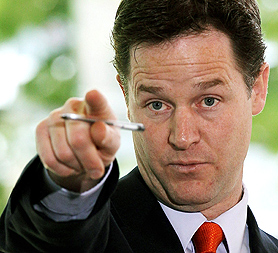Big Bang: Nick Clegg's political revolution
Updated on 19 May 2010
Deputy Prime Minister Nick Clegg has announced sweeping political reforms, pledging the biggest shake-up in British democracy since the Great Reform Act of 1832.

Civil liberties were at the cornerstone of Clegg's "power revolution", with the Liberal Democrat leader promising to lay waste to the ID card scheme and second round of biometric passports, while restricting the DNA database.
Opening the door to "a wholesale, big bang approach to political reform", many of Clegg's reforms fall in line with the Conservative party's Big Society.
However, the Deputy PM's stance risks rifts with the Tory party over the human rights act and tax policies.
Human Rights
In an interview published this morning, Clegg poured cold water on the Tory plan to scrap the Human Rights Act, warning that "any government would tamper with it at its peril".
After his speech, Clegg revealed that there will be a commission looking into the case for a British Bill of Rights, which would build on European Human Rights Act.
Full details will be released in the coalition agreement due to be published shortly, he said, adding that the coalition will seek to raise greater public awareness of the rights they have.
However, Home Secretary Theresa May said earlier today that the two parties were still discussing the issue and have reached "no decision" on the Act just yet.
Gary Gibbon blog: Clegg’s reforms - from clichés to common ground
Tax
Clegg also outlined plans to redistribute tax, rather than lower taxes overall – the latter of which is a priority for the Tories.
"I am saying we’ll rebalance the tax system," he told the The Times. "We're not making great claims about the overall tax burden."
The Tories have agreed to drop cuts to inheritance tax in favour of the Lib Dems policy to increase personal income tax allowances to £10,000.
But his comments will do little to placate unrest from the rightwing, who oppose the proposed hike in Capital Gains Tax (CGT) which is due to be set out in the emergency Budget on 22 June.
Margot James, the Tory MP for Stourbridge, questioned the CGT plans on Twitter: "U don't have to b 'Tory diehard' to be v concerned about increases to capital gains tax, lets hope we can protect incentives via exemptions," she said.
The biggest shake up of our democracy since 1832?
Nick Clegg might not want to extol the virtues of the political partner he jilted at the altar. But by airbrushing Labour's democratic reforms out of the history books, the new deputy PM is sounding a bit as though power’s gone to his head, writes Cathy Newman.
The aim to transform politics is laudable. But unless he's got something up his sleeve, giving women the same voting rights as men in 1928 and even Labour's devolution of power to Scotland and Wales in 1998 were more transformational than anything set out today.
Political reform
Clegg promised to "tear through the statute book" this morning in his first major speech under the coalition, which saw his role as deputy prime minister endowed with special responsibilities for political reform.
Unveiling "our own Great Reform Act", Clegg said he would "take direct responsibility for seeing it through".
Political reforms under the coalition include plans for five-year fixed-term parliaments - with the next election slated for 7 May 2015.
There will be a referendum on an AV electoral voting system, alongside reforms to the House of Lords and the regulation of lobbying. The latter is a £2bn industry and should not be seen as sleazy, Clegg said, but should be transparent.
Voters will be able to sack their MPs, if they are found guilty of serious wrongdoing.
"Not everyone will like it," Clegg acknowledged. Pointing to the proposal to raise the threshold for a vote to dissolve parliament to 55 per cent, he said critics are "completely missing the point".
The move would help ensure stability, he said, dismissing claims that it would make it more difficult to get rid of a government that had lost the confidence of the House of Commons.
Former Labour minister Jack Straw and David Blunkett have in the past attacked the plan, but rightwing dissenters have also voiced discontent - protesting that it was not set out in either manifesto.
People power
Meanwhile, Clegg insisted that the Lib Dem agenda is strongly aligned to Prime Minister David Cameron's Big Society.
"It is difficult to spot the difference between the Tories and the Lib Dems" on issues of devolving the power to the people, he said.
Whitehall paternalism does not work, he says, echoing Cameron's call to empower the people.
He added: "This government will end the culture of spying on its citizens. It is outrageous that decent, law abiding people are regularly treated as if they have something to hide."
Alongside scrapping ID cards and second generation biometric passports, he promised that CCTV will be better regulated and internet and email records will not be kept by the authorities without justification. There will be no ContactPoint childrens database and schools will not collect childrens' fingerprints.
"Taking people's freedom away didn't make our streets safe. Obsessive lawmaking simply makes criminals out of ordinary people," he said.
"So, we'll get rid of the unnecessary laws, and once they're gone, they won't come back. We will introduce a mechanism to block pointless new criminal offences."
Crime
Home Secretary Theresa May also unveiled a slew of "radical" reforms, for the police force, in a seperate speech today.
The coalition government will scrap Whitehall interference, remove targets and ditch paperwork she said, adding that she was "not interested in running the police".
Officers across England and Wales will be given new freedoms and responsibilities, but in return must accept local accountability through elected police commissioners.





